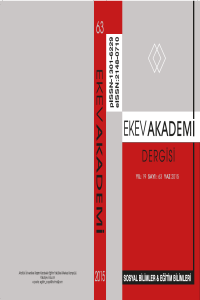Research Article
Year 2015,
Issue: 63, 345 - 356, 31.08.2015
Abstract
Bu çalışmada; Birleşik Devletlerdeki psikoloji laboratuvarlarında yapılmış olan deney sonuçları ele alınmış ve söz konusu sonuçlar teistik açıdan yorumlanmaya çalışılmıştır. Çalışmada modern psikolojinin şekillenmesinde etkili olan ve 1980’li yıllardan itibaren kullanılmaya başlanılan bebek laboratuvarlarının verileri, felsefi açıdan değerlendirmeye tabi tutulmakta ve bu anlamda deneyler felsefi değerlendirme için birer malzeme işlevi görmektedir. Bahsedilen deneylerde, insanların doğuştan Tanrı inancına yatkın olduğu sonucu çıkmıştır. Bu sonuç, İslam’da fıtrat olarak ifade edilen kavramla örtüşmektedir. Çalışma, bu örtüşme üzerinden bir yorum denemesi içermektedir.
Keywords
References
- Akçay, M. (2011). İnsanlığın ortak dini temeli: Fıtrat. Sakarya Üniversitesi İlahiyat Fakültesi Dergisi, XIII, 23: 143-170.
- Arslan, Z. Ş. (2006). Fıtrat kavramı çerçevesinde eğitimde ‘İnsanın neliği’ sorusu. Yayımlanmamış doktora tezi. Marmara Üniversitesi Sosyal Bilimler Enstitüsü İlâhiyat
- Anabilim Dalı Felsefe ve Din Bilimleri Bilim Dalı, İstanbul.
- Barrett, Justin L. (2007). Is the spell really broken? Bio-psychological explanations of religion and theistic belief. Theology and Science, 5,1:57-72. DOI: 10.1080/14 74670060115956
- Bloom, P. (2005). Is God an accident?. The Atlantıc Monthly, p.105-112.
- Bloom, P. (2007). Religion is natural. Developmental Science, 10(1), p.147–151. DOI: 10.1111/j.1467-7687.2007.00577.x
- Bloom, P. (2009). Religious belief as an evolutionary accident. The Believing Primate Editörler: Jeffrey SCHLOSS ve Michael J. MURRAY. New York: Oxford University Press. 118-127.
- Çetin, İ. (1995). John Locke’da Tanrı anlayışı. Ankara: Vadi Yayınları.
- Evans, M. (2000). Why creationism is here to stay. Imagining the Impossible: Magical, Scientific and Religious Thinking in Children. Editörler: K. Johnson ve P. Harris. Cambridge. 305-331.
- Evans, M. (2001). Cognitive and contextual factors in the emergence of diverse belief systems: Creation versus evolution. Cognitive Psychology, 42, p. 217-266.
- Hamlin, J. K. vd. (2007). Some innate foundations of social and moral cognition. Nature, 450 (22), p.557-560.
- Hökelekli, H. (1996). Fıtrat. İslam Ansiklopedisi (13. C. s.47-48) içinde. İstanbul: Türkiye Diyanet Vakfı Yayınları.
- İbn Teymiyye (1978). Der’u tearuz el-Akl ve’n-Nakl. Thk. Muhammed Reşad Salim. Beyrut: Dârü'l-Künuzi'l- Edebiyye.
- İbn Teymiyye (1987). Külliyat 1-9. Çev.: Komisyon. İstanbul: Tevhid Yayınları.
- Kelemen, D. (1999a). Why are rocks pointy? Children's preference for teleological explanations of the natural world. Developmental Psychology 35 (6), p.1440-1452.
- Kelemen, D. (1999b). Function, goals and intention: Children’s teleological reasoning about objects. Trends in Cognitive Sciences 3 (12), p.461-468.
- Kelemen, D. (2004). Are children intuitive theists? Reasoning about purpose and design in natüre. Psychologıcal Scıence, 15 (5), p.295-301.
- Newman, G. E. vd. (2010). Early understandings of the link between agents and order. Proceedings of the National Academy of Sciences of the United States of America 107 (40), p. 17140-17145.
- Okumuşlar, M. (1999). Kuran’a göre din fıtrat eğitim ilişkisi. Yayımlanmamış yüksek lisans tezi. Selçuk Üniversitesi Sosyal Bilimler Enstitüsü Felsefe ve Din Bilimleri Ana Bilim Dalı, Din Eğitimi Bilim Dalı, Konya.
- Ülken, H. Z. (1978). Tarihi maddeciliğe reddiye. İstanbul: Yağmur Yayınları.
- Wynn, K. (2008). Some ınnate foundations of social and moral cognition. The Innate Mind, Volume 3: Foundations and the Future. Editörler: Peter Carruthers, Stephen Laurence ve Stephen Stich. New York: Oxdord Üniversitesi Yayınları.
Year 2015,
Issue: 63, 345 - 356, 31.08.2015
Abstract
References
- Akçay, M. (2011). İnsanlığın ortak dini temeli: Fıtrat. Sakarya Üniversitesi İlahiyat Fakültesi Dergisi, XIII, 23: 143-170.
- Arslan, Z. Ş. (2006). Fıtrat kavramı çerçevesinde eğitimde ‘İnsanın neliği’ sorusu. Yayımlanmamış doktora tezi. Marmara Üniversitesi Sosyal Bilimler Enstitüsü İlâhiyat
- Anabilim Dalı Felsefe ve Din Bilimleri Bilim Dalı, İstanbul.
- Barrett, Justin L. (2007). Is the spell really broken? Bio-psychological explanations of religion and theistic belief. Theology and Science, 5,1:57-72. DOI: 10.1080/14 74670060115956
- Bloom, P. (2005). Is God an accident?. The Atlantıc Monthly, p.105-112.
- Bloom, P. (2007). Religion is natural. Developmental Science, 10(1), p.147–151. DOI: 10.1111/j.1467-7687.2007.00577.x
- Bloom, P. (2009). Religious belief as an evolutionary accident. The Believing Primate Editörler: Jeffrey SCHLOSS ve Michael J. MURRAY. New York: Oxford University Press. 118-127.
- Çetin, İ. (1995). John Locke’da Tanrı anlayışı. Ankara: Vadi Yayınları.
- Evans, M. (2000). Why creationism is here to stay. Imagining the Impossible: Magical, Scientific and Religious Thinking in Children. Editörler: K. Johnson ve P. Harris. Cambridge. 305-331.
- Evans, M. (2001). Cognitive and contextual factors in the emergence of diverse belief systems: Creation versus evolution. Cognitive Psychology, 42, p. 217-266.
- Hamlin, J. K. vd. (2007). Some innate foundations of social and moral cognition. Nature, 450 (22), p.557-560.
- Hökelekli, H. (1996). Fıtrat. İslam Ansiklopedisi (13. C. s.47-48) içinde. İstanbul: Türkiye Diyanet Vakfı Yayınları.
- İbn Teymiyye (1978). Der’u tearuz el-Akl ve’n-Nakl. Thk. Muhammed Reşad Salim. Beyrut: Dârü'l-Künuzi'l- Edebiyye.
- İbn Teymiyye (1987). Külliyat 1-9. Çev.: Komisyon. İstanbul: Tevhid Yayınları.
- Kelemen, D. (1999a). Why are rocks pointy? Children's preference for teleological explanations of the natural world. Developmental Psychology 35 (6), p.1440-1452.
- Kelemen, D. (1999b). Function, goals and intention: Children’s teleological reasoning about objects. Trends in Cognitive Sciences 3 (12), p.461-468.
- Kelemen, D. (2004). Are children intuitive theists? Reasoning about purpose and design in natüre. Psychologıcal Scıence, 15 (5), p.295-301.
- Newman, G. E. vd. (2010). Early understandings of the link between agents and order. Proceedings of the National Academy of Sciences of the United States of America 107 (40), p. 17140-17145.
- Okumuşlar, M. (1999). Kuran’a göre din fıtrat eğitim ilişkisi. Yayımlanmamış yüksek lisans tezi. Selçuk Üniversitesi Sosyal Bilimler Enstitüsü Felsefe ve Din Bilimleri Ana Bilim Dalı, Din Eğitimi Bilim Dalı, Konya.
- Ülken, H. Z. (1978). Tarihi maddeciliğe reddiye. İstanbul: Yağmur Yayınları.
- Wynn, K. (2008). Some ınnate foundations of social and moral cognition. The Innate Mind, Volume 3: Foundations and the Future. Editörler: Peter Carruthers, Stephen Laurence ve Stephen Stich. New York: Oxdord Üniversitesi Yayınları.
There are 21 citations in total.
Details
| Primary Language | Turkish |
|---|---|
| Journal Section | Articles |
| Authors | |
| Publication Date | August 31, 2015 |
| Published in Issue | Year 2015 Issue: 63 |


